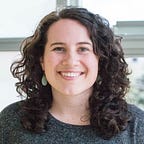Week 8 | Literature Review + Pilot Study
10.19.20
This week I submitted my IRB (still waiting on feedback) and took a stab at writing my first literature review revisiting Ambrose — “How Learning Works”- Chapter 2: How Does the Way Students Organize Knowledge Affect Their Learning?
In my reading, I was particularly influenced by the following two diagrams. The “Organization of Knowledge” and the “Examples of Knowledge Organizations”.
In my analysis of this chapter, I found that although it was framed within the relationship of instructors and student knowledge organization it could also be seen through the framing of experts as counselors or parents. With this in mind, I have begun to consider what different design experiences I could imply to help students develop from novice knowledge organizers into expert knowledge organizers when they are considering the knowledge they’ve gained in post-secondary education to then applying it to their career aspirations?
On another note in our Seminar course this semester I was tasked with outlining a pilot study that aligned with my research topic and I developed the following outline in association with my secondary research questions.
What assistance might students need to engage in long term planning for their future? What does that look like and how should they guide their decisions when planning?
How are students currently making decisions with confidence and what is informing the decisions they make about their post-secondary education?
From here I outlined my participant demographic, activity, what I would want to learn, and how the insights would be useful.
2. Participants & Recruitment
- Students pursuing secondary education
- 18–25 years old
- Carnegie Mellon School of Design D List
3. Activities
- Having students participate in a mental model exercise.
Example framework below.
4. What I want to learn
I would like to gain a better understanding of students' mental models around long term planning. Specifically, how they navigate making confident decisions in relation to their education and career aspirations.
5. Who would find your insights useful, beyond you?
- School Counselors
- Students
- Teachers
- Administrators
- Parents
After reviewing my initial outline I am considering a different approach where I would invite students to draw or design their own mental model encouraging them to visualize how they see their past educational experience, where they are now, and their future aspirations. And then compare their self-assessment to the example of “Knowledge Organization Structures”. Are students seeing these experiences independent of each other, in a linear format, hierarchical, or as an interconnected system?
